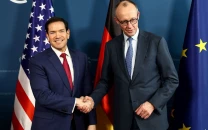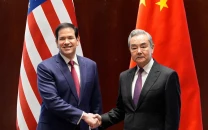Challenges for Af-Pak relations
The real change in Afghanistan-Pakistan relations will come when security is understood as a common goa

Challenges for Af-Pak relations
The most compelling reason for seeking common ground and close cooperation between the two neighbours is very clearly a verdict of history — what hurts Afghanistan will hurt Pakistan and what happens in Afghanistan will also affect regions around the Indus and beyond. This has been a very long historical pattern from pre-colonial times to modern times. Wars and war-makers in Afghanistan, civil conflicts and foreign interventions have always transferred similar trends, or have at least thrown the debris in our direction. Nor has Afghanistan been immune to interventions, whatever intent we attribute to it from this direction, starting from the first Anglo-Afghan war (1839-1842) to the third cycle of conflict (2002-2014). The memories are not very happy ones.
The question is: can the future be different from the past? Yes, it can be. One must reject the determinist position that any two countries with common problems will always remain at odds with each other. The historical evidence from other parts of the world is very different. States with a history of conflicting interests can be friends, good neighbours and even partners. What really makes the difference in such cases is the vision, courage and role of the leaders to determine a new future. It is always the leaders — the governing elite — who changes the course of history. Others, from civil society, can contribute with fresh ideas, push for change through activism and highlight the costs and benefits of policies.
Even with such a complex security environment in which multiple state and non-state actors with conflicting interests are operating in and around Afghanistan, the reasons for bringing Afghanistan and Pakistan together are very compelling. Undeniably, they both share a common interest in defeating militancy — the armed struggles that various groups are engaged in on ethnic, sectarian and political grounds. There appears to be a growing realisation among a large number of policymakers that militant groups have transnational connections and thus pose a transnational security threat. The sooner this realisation translates itself into a concrete policy framework, the better it is for the future security of the two countries.
The fact is that militant groups in both countries have found sanctuaries and sources of support in each other and have, for decades, waged wars against the state there. More troubling is the evidence that some of them have always found encouragement and assistance both by private groups, states and international powers. For too long now, both countries have experienced deadly conflicts owing to the interplay of local, regional and international power-players. This must come to an end. But this will essentially remain a wish, unless political leaders across borders commit themselves to placing peace, security and stability before all else.
The real change in Afghanistan-Pakistan relations will come when security is understood as a common goal, established by strengthening the capacity of the states.
Published in The Express Tribune, November 19th, 2014.
Like Opinion & Editorial on Facebook, follow @ETOpEd on Twitter to receive all updates on all our daily pieces.



















COMMENTS
Comments are moderated and generally will be posted if they are on-topic and not abusive.
For more information, please see our Comments FAQ